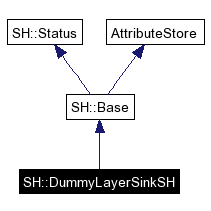
#include <DummyLayerSinkSH.h>
Inheritance diagram for SH::DummyLayerSinkSH:


Public Member Functions | |
| DummyLayerSinkSH (SHGraphManager *mgr, u_int32_t runtimeId, MNSelector &sel) | |
| virtual SH_RC | initSH () |
| virtual SH_RC | uninitSH () |
| SH_RC | push (DataPtr item) |
| virtual SinkEndpoint ** | getSinkSpecs () |
| virtual SourceEndpoint ** | getSourceSpecs () |
| virtual bool | isConnected () const |
Public Attributes | |
| SA_FILE_NAME | _log_name |
| if set, log dummy payload to this file | |
| SA_RTP_INT_PAYLOAD_TYPE | _int_pt |
| the payload is important iff logging is wanted | |
Protected Member Functions | |
| virtual void | pushReport (ReportPtr report, Direction d) |
Protected Attributes | |
| SinkEndpoint * | _in_ep_a [1] |
| DummyLayerSinkEndpoint | _inEP |
|
||||||||||||||||
|
|
|
|
Provide a list of valid sink endpoint specifications to the graph manager.
Implements SH::Status.
|
|
|
Provide a list of valid source endpoint specifications to the graph manager.
Implements SH::Status.
|
|
|
Reimplemented from SH::Base.
|
|
|
Indicate whether a sufficient number of endpoints are connected for the stream handler to be active. This stream handler works always, as it can simply discard packets. Implements SH::Status.
|
|
|
|
|
||||||||||||
|
pushReport(r) can be called on source and sink endpoints, which will in turn call their owning stream handler for forwarding the report into the same general direction. The specific stream handler must overload this call if it wants to evaluate the reports, or if it has downstream or well as upstream endpoints. If the SH does not care about reports and has endpoints on only one side, it needs not overload this function. The reports are ignored and deleted in that case. Reimplemented from SH::Base.
|
|
|
Reimplemented from SH::Base.
|
|
|
|
|
|
|
|
|
the payload is important iff logging is wanted
|
|
|
if set, log dummy payload to this file
|
 1.3.8
1.3.8